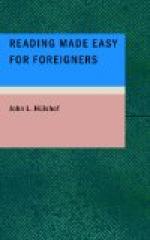But, in a larger sense, we cannot dedicate—we cannot consecrate—we cannot hallow—this ground. The brave men, living and dead, who struggled here, have consecrated it, far above our poor power to add or detract. The world will little note nor long remember what we say here, but it can never forget what they did here. It is for us, the living, rather to be dedicated here to the unfinished work which they who fought here have thus far so nobly advanced. It is rather for us to be here dedicated to the great task remaining before us—that from these honored dead we take increased devotion to that cause for which they gave the last full measure of devotion—that we here highly resolve that these dead shall not have died in vain—that this nation, under God, shall have a new birth of freedom—and that government of the people, by the people, for the people, shall not perish from the earth.
Abraham Lincoln.
November 19th, 1863.
SELECTION XVIII
THE PICKET OF THE POTOMAC
“All quiet along the Potomac,”
they say,
“Except now and then
a stray picket
Is shot as he walks on his beat to and
fro,
By a rifleman hid in the thicket.”
’Tis nothing—a private
or two now and then
Will not count in the tale
of the battle;
Not an officer lost—only one
of the men
Breathing out all alone the
death-rattle.
All quiet along the Potomac to-night,
Where the soldiers lie peacefully
dreaming,
Their tents in the ray of the clear autumn
moon,
And the light of the watch-fires
gleaming.
A tremulous sigh from the gentle night
wind
Through the forest leaves
slowly is creeping,
While the stars up above, with their glittering
eyes,
Keep watch while the army
is sleeping.
There’s only the sound of the lone
sentry’s tread,
As he tramps from the rock
to the fountain,
And thinks of the two in the low trundle-bed
Far away in the hut on the
mountain.
His musket falls slack; his face, dark
and grim,
Grows gentle with memories
tender,
As he mutters a prayer for the children
asleep,
For their mother,—may
heaven defend her!
The moon seems to shine as serenely as
then,
That night when the love,
yet unspoken,
Lingered long on his lips, and when low-murmured
vows
Were pledged, never more to
be broken.
Then, drawing his sleeve roughly over
his eyes,
He dashes the tears that are
welling,
And gathers his gun closer up to its place,
As if to keep down the heart-swelling.
He passes the fountain, the blasted pine-tree—
The footstep is lagging and
weary;
Yet onward he glides through the broad
belt of light,
Towards the shade of a forest
so dreary.
Hark! Was it the night wind that
rustled the leaves?
Is it moonlight so suddenly
flashing?
It looked like a rifle— “Ha,
Mary, good-night!”
His life-blood is ebbing and
dashing.




